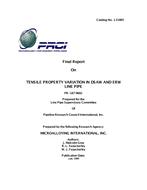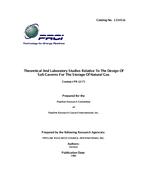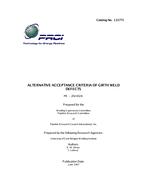Provide PDF Format
PRCI PR-185-04501
- Automated Weld Deposition for Repair of In-Service Pipelines
- Report / Survey by Pipeline Research Council International, 07/30/2007
- Publisher: PRCI
$6.00$12.00
L52244e
Edison Welding Institute/Cranfield University
Need: Hot tapping has been carried out for many years. Up to the mid-seventies, hot taps, with the branch welded to the carrier pipe, were made at full line pressure and full flow. SMAW was used with cellulosic electrodes for root passes and low-hydrogen electrodes for fill and cap passes. Then, due to increasing concerns around the possibility and consequences of burn-through and the lack of definitive research, the practice was to stop the flow of gas in the pipeline and reduce the pressure to less than 60% of maximum operating pressure of the carrier pipe. The only guidelines for welding on in-service pipelines available during this time period were designed to minimize the occurrence of burn-through by reducing the internal pressure of the operating pipeline to a level related to the pipe wall thickness. By the early nineties, as the technology to successfully develop, validate, qualify and complete welds on in-service pipelines became better defined, standard practice reverted to welding at full line pressure and full flow; under these circumstances low-hydrogen welding electrodes were used exclusively.
Result: The objectives of the project were to develop and build a prototype automated system for corrosion repair welding operations on in-service liquid and gas transmission pipelines that incorporates a real-time adaptive control system (to ensure reliable welding conditions) and to validate the system by performing a field trial..
Benefit: This project developed a prototype multi-axis automatic welding system with adaptive control and tracking for use on in-service welding repairs on liquid and gas transmission pipelines. The system is capable of deploying either gas metal arc welding (GMAW) or flux cored arc welding (FCAW) to weld pressure-containing sleeves (Type B), to weld reinforcement sleeves (Type A), or to directly deposit a layer of weld over an area to replace metal loss due to corrosion. The welding system was field tested at TransCanada in North Bay, Ontario and was demonstrated during a workshop at Edison Welding Institute in Columbus, Ohio. In addition, preliminary in-service welding trials with GMAW and FCAW were performed on high strength pipeline steels (X80, X100 and X120) to determine the susceptibility of hydrogen cracking, under simulated in-service welding conditions.
Edison Welding Institute/Cranfield University
Need: Hot tapping has been carried out for many years. Up to the mid-seventies, hot taps, with the branch welded to the carrier pipe, were made at full line pressure and full flow. SMAW was used with cellulosic electrodes for root passes and low-hydrogen electrodes for fill and cap passes. Then, due to increasing concerns around the possibility and consequences of burn-through and the lack of definitive research, the practice was to stop the flow of gas in the pipeline and reduce the pressure to less than 60% of maximum operating pressure of the carrier pipe. The only guidelines for welding on in-service pipelines available during this time period were designed to minimize the occurrence of burn-through by reducing the internal pressure of the operating pipeline to a level related to the pipe wall thickness. By the early nineties, as the technology to successfully develop, validate, qualify and complete welds on in-service pipelines became better defined, standard practice reverted to welding at full line pressure and full flow; under these circumstances low-hydrogen welding electrodes were used exclusively.
Result: The objectives of the project were to develop and build a prototype automated system for corrosion repair welding operations on in-service liquid and gas transmission pipelines that incorporates a real-time adaptive control system (to ensure reliable welding conditions) and to validate the system by performing a field trial..
Benefit: This project developed a prototype multi-axis automatic welding system with adaptive control and tracking for use on in-service welding repairs on liquid and gas transmission pipelines. The system is capable of deploying either gas metal arc welding (GMAW) or flux cored arc welding (FCAW) to weld pressure-containing sleeves (Type B), to weld reinforcement sleeves (Type A), or to directly deposit a layer of weld over an area to replace metal loss due to corrosion. The welding system was field tested at TransCanada in North Bay, Ontario and was demonstrated during a workshop at Edison Welding Institute in Columbus, Ohio. In addition, preliminary in-service welding trials with GMAW and FCAW were performed on high strength pipeline steels (X80, X100 and X120) to determine the susceptibility of hydrogen cracking, under simulated in-service welding conditions.
Related Products
PRCI PR-12-71
Theoretical and Laboratory Studies Relative to the Design of Salt Caverns for the Storage of Natural..
$198.00 $395.00




